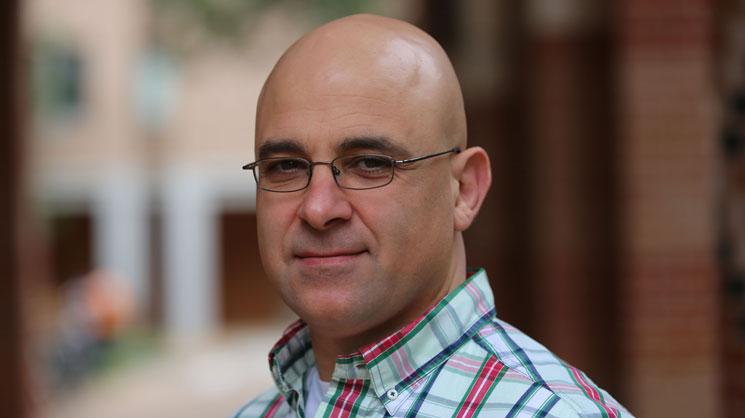Computer Science professor to receive Brown Prize, Rice’s top teaching award. Rice alumni have selected Luay Nakhleh for the George R. Brown Prize for Excellence in Teaching. The Brown Prize, Rice’s highest teaching award, is given annually based upon a survey of alumni who graduated within the past two to five years.
“In academia, there are all sorts of awards that faculty are eligible for, but this one is so special because it comes from the students,” said Nakhleh, the J.S. Abercrombie Professor of Computer Science, professor of biochemistry and cell biology and department chair of computer science. “We are spoiled at Rice with the quality of our students. If the students are not good, even the most passionate teacher loses their passion.”
Nakhleh is the first professor from Computer Science to win the prize.
“It feels good that the Department of Computer Science is being recognized,” he said. “As the largest department on campus … I feel we do a very good job at teaching in the face of very large enrollments.”
Nakhleh will receive the award at the Center for Teaching Excellence’s University Awards Ceremony and Reception April 18 at Duncan Hall’s McMurtry Auditorium. Students, faculty, alumni and staff are encouraged to attend the ceremony from 3 to 5 p.m.; a wine and appetizer reception will follow. Robert Werth, the 2018 Brown Prize recipient, will present a lecture on teaching excellence titled “Multiple methods, new knowledges and dis/comfort: The classroom as experimental space.”
Nakhleh said he always knew he wanted to teach, a desire cemented by teaching high schoolers for a year after earning his undergraduate degree.
“I taught every semester of graduate school — even the semesters I wasn’t supposed to teach,” he said. “I love teaching.”
Nakhleh said he takes a natural approach to teaching rather than relying on a strategic plan.
“Many people talk about their approach to teaching by referencing educational psychology articles,” he said. “I’ve never read a single book or article on how to teach.”
Nakhleh said passion and knowledge are the most important elements in making a good teacher.
“If the instructor is not passionate, the students will be turned off immediately,” he said. “If the professor is passionate, but not knowledgeable or doesn’t exude confidence about the material in the classroom, they will also lose the students.
“I feel the students can tell which faculty members are passionate and which ones are there because it’s simply part of their job. These days, people talk about how traditional lecture-style teaching is not good for the next generation and, ironically, that’s how I lecture to 200 students. I don’t record videos. I literally stand in front of a chalkboard and talk.”
Nakhleh once experimented with the flipped classroom model, which involves delivering instructional content online, usually via video.
“I tried it for one year and I abandoned it,” he said. “The first thing I lost was seeing the students’ faces. When I’m teaching, I need to see the student’s reactions — the pain when they don’t understand and the happiness when they do.”
This isn’t Nakhleh’s first teaching award. He received the Phi Beta Kappa Teaching Award in 2009, the (T + R) 2 Award from Rice’s School of Engineering in 2015 and the Outstanding Doctoral Thesis Adviser Award from Engineering in 2018. While pursuing his Ph.D. at the University of Texas, he earned the Texas Excellence Teaching Award and the Outstanding Teaching Assistant Award.
“I like to learn from the good teachers I’ve had as well as the bad teachers,” he said. “Just as I learn from poor speakers and good speakers. I always pay attention to the styles of teachers and speakers, not only the contents they deliver. When I dislike a certain style, I make sure to avoid it when I teach.”
Nakhleh joined Rice in 2004. He holds a bachelor’s degree from the Technion – Israel Institute of Technology, a master’s from Texas A&M University and a doctorate from the University of Texas, all in computer science.
Nakhleh’s advice for new teachers is to remember the importance of caring for students.
“Caring about them doesn’t mean giving them high grades or giving them everything they want,” he said. “I think as long as you care about them, they accept the strictness. I also think it’s important to be professional. Showing up on time, leaving on time and having dependable office hours. For me, if I have a meeting with someone, it doesn’t matter if it’s the most important professor or a freshman, I treat them with the same respect and professionalism.”
Nakhleh’s teaching load was reduced to one course a year after he became chair of the Department of Computer Science in 2017. He chose to continue teaching one of the largest courses in the department.
“Some can look at teaching as a burden, but I look at teaching as the thing that keeps me sane,” he said. “I cannot imagine myself being in a job where I cannot teach.”
The course Nakhleh leads, COMP 182 algorithmic thinking, teaches students math “and how it is used in computer science,” he said. “I show them how math translates to application so they understand why they are learning math.”
In addition to teaching, Nakhleh conducts research in the area of computational biology, focusing on evolutionary questions.
“I love getting to know the students,” Nakhleh said. “I’m still friends with students I’ve taught more than 10 years ago. You see the diversity, strength and interest of Rice students, and that’s what keeps teachers going. If I taught to a room full of apathy every day, I assure you I would lose my interest in teaching.”
Nakhleh ends his final lecture each year with a quote from theoretical physicist Richard Feynman: “I would never accept any position in which somebody has invented a happy situation for me where I don’t have to teach. Never.”
Kendall Schoemann, staff writer, Office of Public Affairs.

